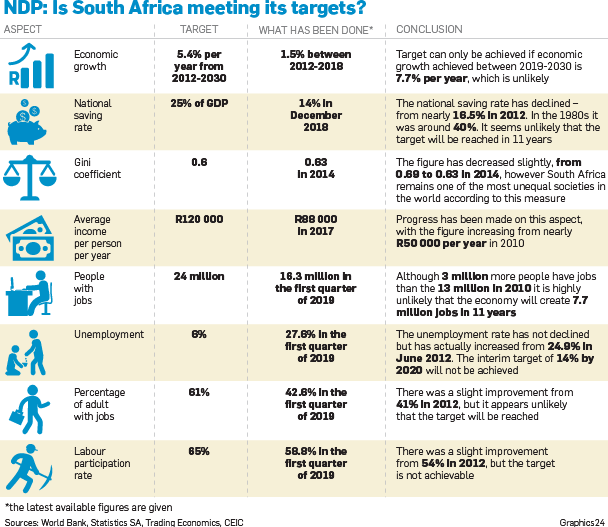
This is the first phase of 43 projects that aim to inject the economy with R840 billion and create 155 000 jobs
Four of the 43 private sector projects that could see an economic injection of R840 billion and 155 000 jobs over the next five years are set to get off the ground this year.
These projects include the expansion of a Beefmaster abattoir and deboning facility, the establishment of local parts manufacturers in the automotive industry, specific forestry plantations and paper processing plants and the founding of an agricultural development agency, said Johan van Zyl, one of the business leaders heading up the Public-Private Growth Initiative (PPGI).
In his state of the nation address earlier this month, President Cyril Ramaphosa referred to the success of the PPGI.
The initiative has facilitated commitments to 43 private projects in 19 sectors of the economy over the next five years.
Roelf Meyer, a former cabinet minister who played an important role in South Africa’s transition to democracy, and Van Zyl, the CEO of Toyota Europe, are the driving forces behind the initiative.
Van Zyl told City Press’ sister publication Rapport that the undertaking by private businesses is, to a large extent, over and above Ramaphosa’s target of $100 billion (R1.4 trillion) in new investments over the next five years.
At least R290 billion in undertakings to invest were made at Ramaphosa’s SA Investment Conference in October.
Speaking from Brussels, Belgium, Van Zyl said job creation at new facilities could already have an impact this year.
According to Meyer, there will be continuing consultation with the management of the companies involved, so that progress may be monitored.
The president will also be kept in the loop.
The leaders of the initiative have already met with Jackson Mthembu, the minister in the presidency for planning, monitoring and evaluation, who was involved in the initiative, Meyer said.
. Forestry: The expansion and upgrading of pulp-, paper- and bio-refinery plants; new plantations and the recapitalisation of damaged facilities; and the expansion and modernisation of 10 sawmills in five provinces;
. Agriculture: Citrus export growth project, and commercialisation of heavy grain producers;
. Military and defence: Upgrading of border post infrastructure and management of the most important border posts;
. Water: The repair and construction of municipal water and sanitation purification plants in specific towns and cities;
. Construction: Physical upgrades to six of South Africa’s border posts;
. Pharmaceuticals: Local production of sterile products and the manufacturing of general and local anaesthetic products; and
. Infrastructure: A ship reclamation facility at Saldanha Bay in the Western Cape.
According to Van Zyl, these projects include new manufacturing plants, as well as the expansion of existing facilities and capacities.
The PPGI consists of business representatives from various sectors, including the automotive industry, tourism, forestry, information technology, business services, mining, construction, transport and renewable energy, as well as the oil, gas and water industries.
According to Meyer, the initiative has been up and running for the past six months and is therefore still in its early phase, but it is nevertheless a continuing project.
He emphasised that it was not an organisation, but an initiative that acted as a mediator between government and the private sector, with which it has good relationships on both sides.
He said the initiative followed a chance meeting between him and Van Zyl over a beer in a bar in Brussels.
Meyer was there attending a conference and Van Zyl works there. They met shortly after Ramaphosa’s Thuma Mina speech in February, in which he called on all South Africans to help where they could.
Van Zyl had just returned from Japan and spoke of the country’s reconstruction and development plan following World War 2.
In its dealings with government, the PPGI has also pointed out obstacles that make it difficult to get projects off the ground.
In the state of the nation address, Ramaphosa emphasised that government was giving urgent attention to reforms designed to make it easier to do business in South Africa.
According to a World Bank index on the ease of doing business in various countries, South Africa is ranked 82 out of 190 economies. A decade ago, it was at 32.
Ramaphosa referred to the consolidation and easing of regulatory processes, the automation of permits and other applications, and the reduction of compliance costs, all meant to alleviate the burden on businesses.
According to Meyer, the relationship between government and business is much better than it was in the Jacob Zuma era.
Although 10 years have been lost, there is now an opportunity to create a growth environment in the country. But it won’t happen in a single year.
South Africa now can be compared with where the country was in the 1980s, when it had a large amount of debt. It took until well after 1994 for the country to recover fully.
Meyer, however, said that South Africa now found itself in a more difficult position than it previously did because the whole world was eager to assist the country after the fall of apartheid.
Now investors are merely watching to see what happens.
Still, confidence was slowly being restored, and that was why Ramaphosa’s strong message on issues like the independence and mandate of the SA Reserve Bank were important, said Meyer.




 Publications
Publications
 Partners
Partners









